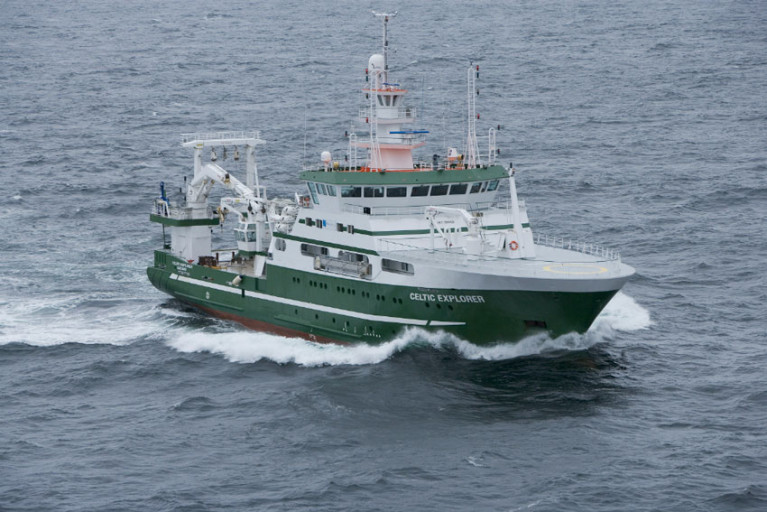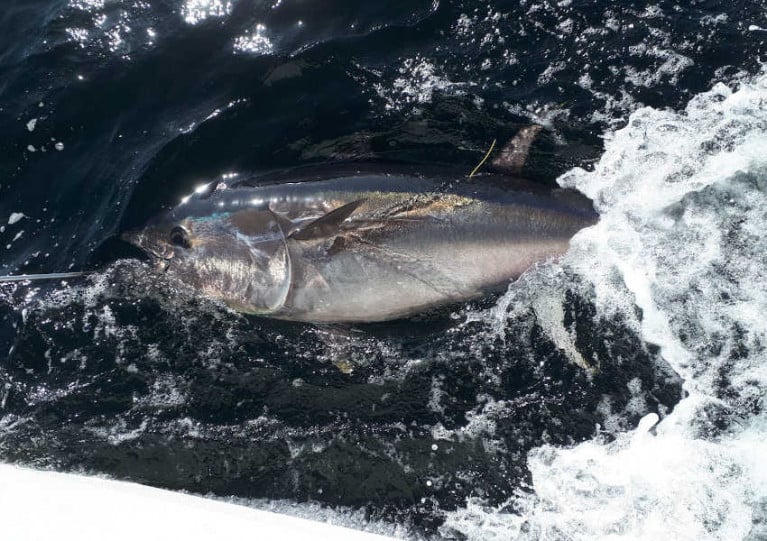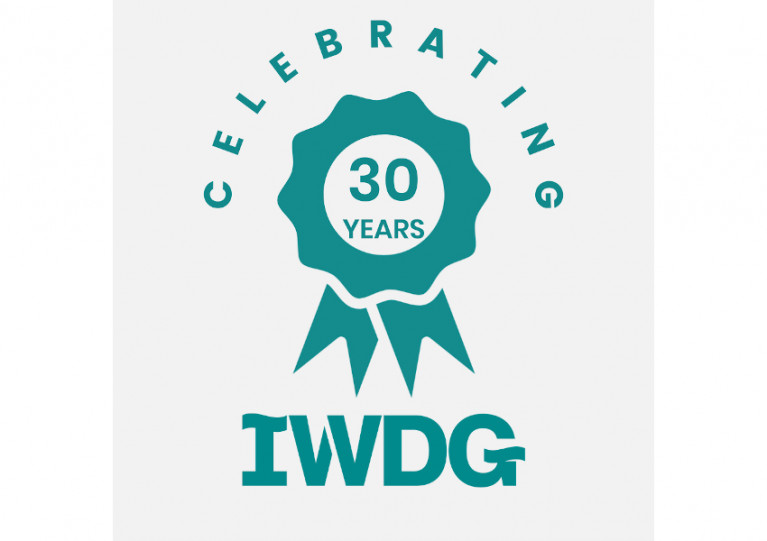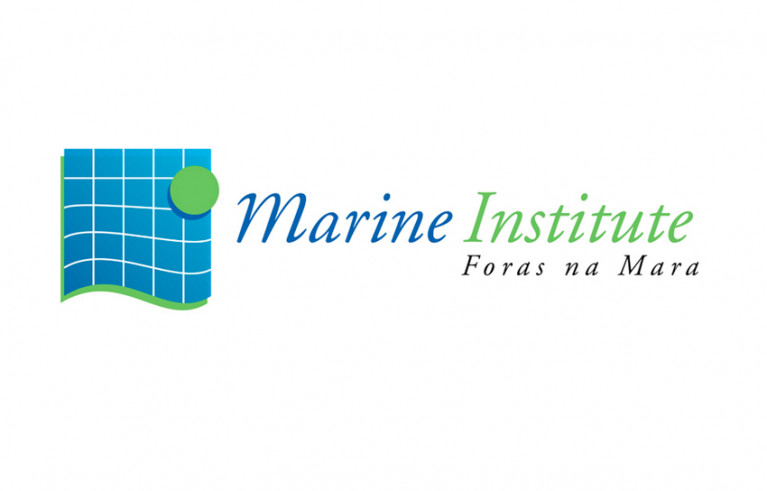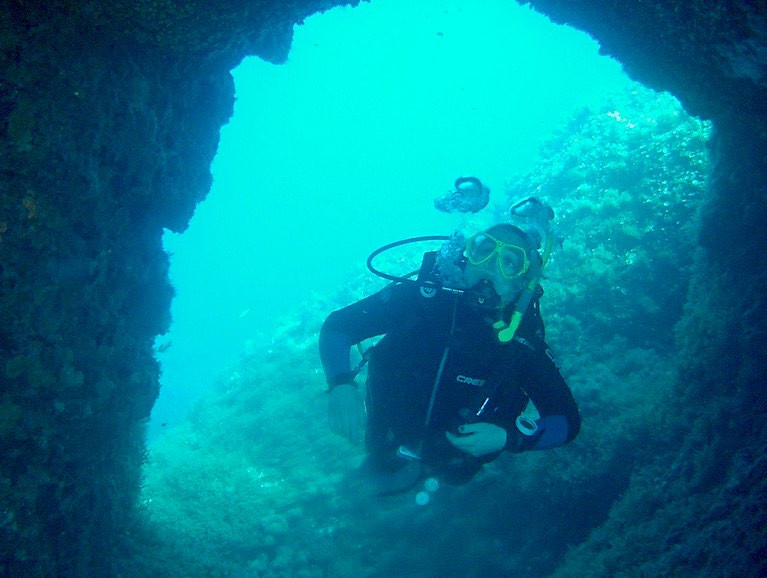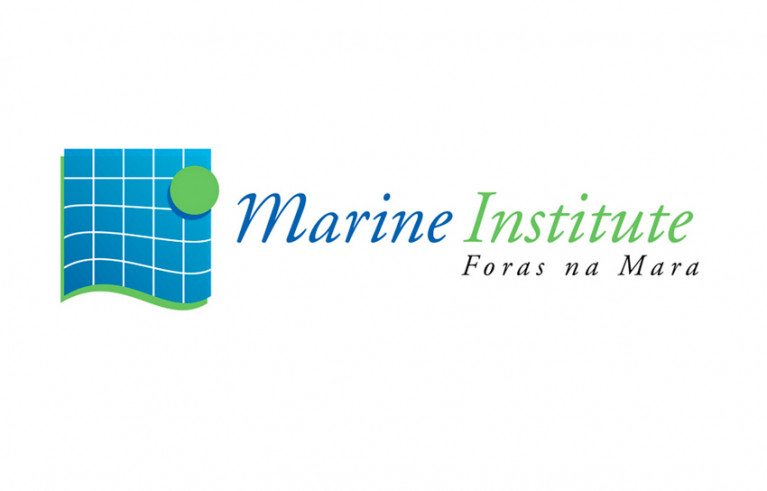Displaying items by tag: Marine Institute
Health Check for the Atlantic on the Ocean Climate Survey
Scientists from the Marine Institute, Maynooth University and the National University of Ireland Galway were recently aboard the RV Celtic Explorer, for a 14-day scientific survey studying the shelf and deep water off the west coast of Ireland. This Marine Institute’s annual ocean climate survey has been running since 2006 and facilitates long-term physical and biogeochemical observations of the deepwater environment in the South Rockall Trough.
The Rockall Trough is an important region that provides a pathway for the transport of heat and salt from the North-East Atlantic to the Nordic Seas, where waters are subjected to phenomena such as deep convective mixing that creates cold dense water. Water exchange and interactions in the Rockall Trough play a fundamental part in the overall thermohaline circulation in the North-East Atlantic; as large volumes of warm water pass through the Rockall Channel, before flowing into the Nordic Seas with a return of cold dense bottom water outflow spilling into the region. Changes in the region’s water properties, such as temperature and salinity, vary on inter-annual and decadal time scales.
Chief Scientist on the research survey, Dr Caroline Cusack of the Marine Institute said, “Scientific data collected on this survey allows the assessment of interannual variability of physical and biogeochemical conditions that impact shelf and deep waters. This variability can have a range of impacts on ocean ecosystems, ocean circulation and weather patterns. The survey contributes to activities of the International Council for the Exploration of the Sea and provides support to the Convention for the protection of the marine environment of the North-East Atlantic (OSPAR Convention), the Marine Strategy Framework Directive focused on protecting ocean health, and climate change assessments.”
This year, Maynooth University scientists from the A4 project (Aigéin, Aeráid, agus athrú Atlantaigh = Oceans, Climate, and Atlantic Change) joined the survey to work with the Marine Institute oceanographic and climate services team. The A4 project, supported by Marine Institute funding, studies how changes in the Atlantic impact Ireland and northwestern Europe through changes in ocean circulation and sea level and is developing predictive capacity for these regions. Recent research by the A4 project found that the Gulf Stream System, also known as the Atlantic Meridional Overturning Circulation (AMOC), is at its weakest in over a millennium.
Scientists from the National University of Ireland, Galway were also on board the RV Celtic Explorer working with Marine Institute chemists to collect supporting chemistry information. The NUI Galway scientists are currently working on the Marine Institute funded VOCAB project (Ocean Acidification and Biogeochemistry: Variability and Vulnerability) to enhance knowledge on the vulnerability of selected marine ecosystems in Irish waters to ocean acidification. NUI Galway scientists also collected samples relevant to the JPI Climate and JPI Oceans CE2COAST project which aims to downscale global climate models to regional and local scales to provide information on the impacts of climate change tailored to local needs.
Mick Gillooly, Director of Ocean Climate and Information Services at the Marine Institute said, “Collaborative oceanographic research is very important to help inform Ireland’s response to climate change and underlines the importance of researching marine impacts of climate change, which could have a significant societal impact on Ireland. The Marine Institute’s annual climate survey, with scientific experts from collaborating research groups, enables us to generate a long-term time series of key oceanographic data to further increase our knowledge about our changing ocean climate.”
This year, 51 stations were occupied with 301 depths sampled. At each station, scientists profile the full water column and collect measurements of temperature, salinity and oxygen. Water samples are collected at targeted depths and analysed on board to determine the salinity, dissolved oxygen, inorganic nutrients and carbon content (DIC/TA). The RV Celtic Explorer’s advanced underway data acquisition system gathers information on temperature, salinity, fluorescence, and pCO2 in surface waters. This year, the Marine Institute also had a laboratory on board equipped with state-of-the-art analysers, enabling near real-time reporting of nutrients, oxygen and salinity.
The annual ocean climate survey supports a number of Marine Institute ocean observation programmes. The Irish Marine Data Buoy Observation Network, managed by the Marine Institute in collaboration with Met Éireann, is a network of five offshore weather observing marine buoys around Ireland. The M6 Data Buoy, located hundreds of kilometres to the west of Ireland in the South Rockall Trough, was a station sampled during this scientific survey.
A Marine Institute glider, an underwater autonomous vehicle, was also deployed near the M6 Data Buoy during this survey. The glider can reach depths of 1,000 metres and collects oceanographic data on conductivity, temperature, depth, fluorescence, turbidity and dissolved oxygen. Since its deployment, the glider has travelled more than 350 kilometres collecting additional oceanographic data for the scientists involved.
Scientists also deployed two Argo Floats, which measure temperature, salinity and depth with one Argo Float also taking measurements of the water oxygen content. Argo Floats are autonomous instruments that remain at sea for a period of three to five years which provide high-quality temperature and salinity depth profiles while ascending and descending to and from the surface from a depth of 2,000 metres, as it drifts through the ocean. There are currently about 4,000 Argo Floats in the world's oceans. As part of Ireland’s participation in the Euro-Argo ERIC Programme, the Marine Institute deploys three Argo Floats each year.
The track and data from current Irish Argo Floats can be viewed here
The annual ocean climate survey, the A4 project and VOCAB (Ocean Acidification and Biogeochemistry: variability, trends and vulnerability) are supported by the Marine Institute under the Marine Research Programme funded by the Irish Government.
Clew Bay and Achill, Co Mayo will be among the key study areas in SeaMonitor, a unique marine research project which is using innovative marine species tracking technology to better understand and protect vulnerable marine life in our oceans. The project is funded by EU INTERREG VA Programme and led by the Loughs Agency and supported by another eight leading marine research institutions, including the Marine Institute.
The innovative technology, called passive acoustic telemetry, relies on underwater tracking stations (acoustic receivers) to monitor the movements of marine animals tagged with acoustic transmitters. This technology will be used to better understand the movement and behaviour of species such as seals, basking shark, skate, cetaceans and salmon.
This new technology will be utilised in Clew Bay and Achill, to enable the Marine Institute to monitor juvenile salmon smolts as they make their first journey past Clare Island and on to the Atlantic Ocean. Acoustic receivers will be placed in strategic positions on what has been identified as the salmon “highway” through Clew Bay. This research will build on previous studies in the area, which indicate a high survival rate of salmon smolts through the Inner Bay and to Clare Island. Studies have also indicated that smolts following ocean currents seem to travel the northern route past Clare Island.
 Clare Island, Co Mayo Photo by Catherine Waters/Marine Institute
Clare Island, Co Mayo Photo by Catherine Waters/Marine Institute
As part of the SeaMonitor project, the Marine Institute will be tagging smolts from the Burrishoole catchment over the next two years. Their journey will be monitored through Clew Bay and Achill, onward along the shelf edge, west of Scotland and to the Norwegian feeding grounds from May to June. The salmon smolts will be monitored by the Marine Institute using a Slocum glider, an autonomous remotely operated vehicle. The glider acts as a mobile listening device for the acoustic signals from tagged fish, and has the capability to monitor environmental conditions such as temperature, salinity and current profiles. The range of the remotely operated vehicle and its ability to remain at sea for months at a time, allows the tracking of salmon and other marine species further and for longer periods than ever before.
"The salmon smolts will be monitored by the Marine Institute using a Slocum glider, an autonomous remotely operated vehicle"
“Scientists still know very little about the detailed migration routes of Atlantic salmon, within the marine environment,” said Dr Ciaran Kelly, Director of Fisheries Ecosystems and Advisory Services at the Marine Institute. “Using new technology to track the migration pathways of Atlantic salmon smolts through Clew Bay, Achill and beyond, will greatly increase our understanding of migration and identify important marine habitats for Atlantic salmon.”
“The Marine Institute’s Newport Research Facility has a long and distinguished record of conducting scientific work on Atlantic salmon. The Marine Institute appreciates the support and assistance from local fishermen in Co Mayo for marine research projects such as SeaMonitor,” Dr Kelly added.
SeaMonitor project partner, Queen’s University Belfast, will also monitor skate and basking shark in Irish waters including Clew Bay and Achill. Using acoustic technology and satellite tagging technology, Queen’s University Belfast aims to gain a better understanding of the movement patterns and residency of these fish to develop management plans for these highly sensitive and vulnerable species.
The SeaMonitor project will also deliver Europe’s largest telemetric marine array, stretching over 60 kilometres and comprising of over one hundred acoustic listening stations. ‘Europe’s largest fish counter’ is being deployed off the north coast of Ireland and will bridge the gap between Malin and Islay forming an acoustic detection line between Ireland and western Scotland. This technology will allow scientists to monitor the movement of tagged marine animals resident in this area or passing through during annual oceanic migrations.
Funding for the SeaMonitor project has been provided by the EU’s INTERREG VA Programme (Environment theme), which is managed by the Special EU Programmes Body (SEUPB). Match-funding for this project has been provided by the Department for Agriculture, Environment and Rural Affairs in Northern Ireland and the Department of Housing, Planning and Local Government in Ireland.
Marine Institute Awards First Two Eoin Sweeney Scholarships
The Marine Institute has announced funding of €0.24 million for the first two Eoin Sweeney PhD Scholarships to run over the next four years.
This Scholarship Programme has been established by the Marine Institute and Plataforma Oceánica de Canarias (PLOCAN) in memory of Eoin Sweeney (1947-2017), who made a significant contribution to developing Irish marine industry, particularly the ocean energy sector, including the establishment of test-bed sites off the west coast of Ireland that provides sea-state testing opportunities for researchers and technology developers.
This Scholarship Programme provides a unique training opportunity for the students using the state-of-the-art scientific facilities at the Plataforma Oceánica de Canarias (PLOCAN) in Gran Canaria, Spain.
Dr José Joaquín Hernández-Brito, CEO said, “PLOCAN are delighted to collaborate with colleagues in Ireland on this Scholarship Programme. We are looking forward to hosting the students in due course, and wish to strengthen our existing research networks between Spain and Ireland together with exploring opportunities for future co-operation in ocean observation.”
The students will also benefit from access to the Marine Institute historical datasets, equipment and infrastructures including access to the national marine research vessels such as the new RV Tom Crean.
Congratulating the award recipients, Mick Gillooly, Director of Ocean Climate and Information Services in the Marine Institute said, “This is an exciting collaboration between the two Universities, PLOCAN and the Marine Institute that enables international collaboration and testing of novel technology, gliders and data buoys, to better understand our ocean ecosystems through long-term observations. Forecasting Ocean and Climate Change is a strategic focus area in the Marine Institute’s Strategic Plan and these scholarships will provide research data from a variety of locations and sea conditions, which will contribute to scientific advice to stakeholders backed up by high-quality peer-reviewed research.”
The awards funded are as follows:
|
PhD Project Title |
Lead Organisation |
Grant-Aid Funding Awarded (for 4 years) |
|
Application of AUVs to studies on Diel cycles of ocean plankton and biogeochemistry in the Northeast Atlantic |
NUI Galway |
€120,000 |
|
Wave-powered data buoy |
Maynooth University |
€120,000 |
The students are expected to have commenced by July 2021, with their first visit to PLOCAN expected to take place in 2022 (dependent on government restrictions).
Funding for the Eoin Sweeney Scholarship Programme is provided by the Marine Institute and the Irish Government, funded under the Marine Research Programme. PLOCAN will provide support and host the scholars for two to three months per annum.
Next Leg of Irish Anglerfish & Megrim Survey 2021 Set for April
The next leg of this year’s Irish Anglerfish and Megrim Survey (IAMS 2021) will be carried out from 10-21 April off the North and North West coasts.
The IAMS is carried out by the Marine Institute in fulfilment of Ireland’s obligations under the Common Fisheries Policy (CFP).
A demersal trawl survey, April’s leg will consist of some 50 otter trawls of 60 minutes’ duration in ICES area 6a.
Fishing will take place within a three-nautical-mile radius of the positions indicated in Appendix 1 and 2 of Marine Notice No 15 of 2021, a PDF of which can be downloaded below.
The survey will be conducted from the RV Celtic Explorer (callsign EIGB) which will be towing a Jackson demersal trawl and will display appropriate lights and signals.
All marine operators, especially those engaged in commercial fishing, are requested to keep a 3mn area around the indicated tow points clear of any gear or apparatus during the survey period.
Bluefin Tuna Data Collection Fishery Programme Returns for 2021
Building on the success of pilot programmes in 2019 and 2020, the Tuna CHART (CatcH And Release Tagging) fishery to collect scientific data on bluefin tuna will return in 2021, subject to COVID-19 restrictions.
Tuna CHART is a collaborative scientific programme between Inland Fisheries Ireland and the Marine Institute in partnership with the Sea Fisheries Protection Authority, the Department of Agriculture, Food and the Marine (DAFM) and the Department of Environment, Climate and Communications (DECC).
In 2020, the Tuna CHART programme authorised 22 charter skippers to operate a scientific fishery — in which anglers participated fully — to catch, tag and release bluefin tuna. These professional skippers were trained to tag, measure and record bluefin data.
Despite the limitations of the pandemic, 685 bluefin tuna were caught, tagged and released around the Irish coast — a 230% increase in bluefin tagged on the previous year.
 File image of bluefin tuna in Donegal Bay Photo: David Morrissey
File image of bluefin tuna in Donegal Bay Photo: David Morrissey
The most productive sites were the North-West and the South coast, mainly the waters of the Cork coastline. As many as 11 bluefin were tagged on one angling trip, a new Irish record. The largest tuna tagged was 275cm, weighing an estimated 822lbs.
All tuna were carefully handled subject to strict guidelines set by the Tuna CHART programme and all were released alive. Data from the tagging programme has been collated by the partnership for reporting to the International Commission for the Conservation of Atlantic Tuna (ICCAT).
This year a maximum of 25 authorisations may be granted to qualifying vessels and skippers around the Irish coast for fishing between 1 July and 12 November. Applications are now open and will be accepted until 1pm on Friday 9 April.
Depending on the successful operation and review of this year’s fishery, it is intended that a scientific catch-and-release fishery may also operate in 2022.
The partnership says a core aspect of the Tuna CHART programme is the welfare and successful release of the bluefin tuna. Authorised skippers will be required to have high specification rods, reels and line in advance of the open season in order to ensure that the fish is brought alongside the vessel to be measured and tagged in the water in a timely manner.
Data collection for scientific assessment is the primary purpose of the fishery and will continue to be a key requirement for skipper participation in this scientific catch-and-release fishery, the partnership adds.
Skippers will be required to collect data on every bluefin trip undertaken and each bluefin tuna they catch, tag and release, and their angling and data recording expertise is an important part of the overall survey programme.
Anglers will have an opportunity to participate in this fishery and contribute to this important scientific study by chartering and fishing from authorised vessels only. Unauthorised vessels are not permitted to target or catch bluefin tuna, and any unauthorised person found to be targeting bluefin tuna will be prosecuted. Applications for authorisations are open to charter skippers only.
Irish Whale & Dolphin Group to Provide Marine Mammal Observer on Upcoming Fisheries Surveys
The Irish Whale and Dolphin Group (IWDG) won the tender to provide a marine mammal observer on three fisheries acoustic surveys with the Marine Institute this year.
These include a survey for blue whiting this month, the Western European Shelf Pelagic Acoustic (WESPAS) survey during June and July and the Celtic Sea Herring Acoustic Survey in October.
The aforementioned missions are annual stock assessment surveys and cover a huge area of the Irish EEZ.
Data on higher trophic predators such as marine mammals and seabirds are essential to provide the data to support the development of an ecosystem approach to fisheries management.
Experienced offshore surveyor Dr Justin Judge will be joining each cruise to record all sightings of whales and dolphins and other interesting endangered, threatened and protected (ETP) species, as well as recording the vessels’ track and environmental conditions.
He follows in the footsteps of Dave Wall, who used data collected from these annual surveys in 2014 to built the dataset to publish the first Offshore Atlas of Marine Mammal Distribution.
Aquaculture Advances in Marine Institute Researchers Showcase at Burrishoole Research Day
On Thursday 25th February 2021, the Marine Institute will host the Burrishoole Research Day, a virtual symposium showcasing the wide network of researchers connected to the Marine Institute’s Newport Research Facility in Co Mayo.
The symposium will include short talks from 26 researchers representing seven Irish and UK Higher Education Institutions, including the Marine Institute. Researchers will share insights into their research projects and advances in areas such as climate change, fish telemetry, genomics, aquaculture and ecological change.
The Newport Research Facility in Co Mayo has been in operation since 1955, and has been part of the Marine Institute since 1999. Located at the base of the Burrishoole catchment, the facility is located at the interface of the freshwater and marine ecosystems. The combination of the unique location, and long time series of environmental datasets have attracted national and international researchers to the facility for many decades.
Fisheries research at the Newport Research Facility focuses on migration, ecology, genetics, population dynamics and management advice for species including salmon, sea trout, eel, sea bass, blue fin tuna, pollack and stickleback. There are also a range of research projects on the impacts of climate and land use change on aquatic ecosystems, limnology, oceanography and sustainable aquaculture.
Researchers based at the Marine Institute’s Newport Research Facility have secured competitive funding in a number of research areas. As part of the Marine Institute’s Cullen Scholarship Programme, a number of postgraduate students have also been based at the Newport Research Facility to work on projects relevant to the Marine Institute whilst studying for a higher degree. The resulting research network, encompassing researchers from the Marine Institute and Higher Education Institutes, is diverse and collaborative. This symposium will highlight progress on research projects in the last three years, as well as introduce some new projects.
The symposium will include four sessions via Zoom from 10am to 4pm on Thursday 25th February 2021. To access the programme and the Zoom link, email [email protected]
Marine Institute Recruiting for Oceanographer
The Marine Institute is recruiting for a physical oceanographer to join its existing team of oceanographers and modellers to gather, analyse and generate services from oceanographic data.
The oceanographer will support the institute’s data collection at sea and work with data management colleagues to robustly archive, quality assure and analyse the oceanographic datasets of interest to users.
These include — but are not limited to — tide gauges, offshore weather buoys, conductivity, temperature and depth (CTD) profiles from ships, CTD from moored platforms, ocean gliders, Argo floats and acoustic Doppler current profilers (ADCP).
This temporary specified purpose contract of employment, providing redeployment cover, will run for up to 31 December 2023. The successful candidate will be on probation for the first six months.
A detailed job description is available from the Marine Institute website, and the closing date for applications is Wednesday 24 February at 12 noon.
Female Marine Scientists on the Crest of a Research Wave
Some 30 per cent of researchers worldwide are female, according to UNESCO which marks International Day of Women and Girls in Science this week
About 35 per cent of all students in STEM-related fields – that’s science, technology, engineering and maths – are women, UNESCO says.
However, about 51 per cent of staff at the Marine Institute in Galway are female, and about 70 per cent hold key roles in science, technical analysis and research, extending from oceanography and ocean climate to fishery ecosystems, marine environment and food safety.
Marine Institute director of corporate services Patricia Orme says the organisation also has women working in policy, innovation and research, maritime development and corporate roles.
“We are extremely proud to note that 80% of our female employees hold bachelor, masters or doctorate level qualifications," she says.
Wavelengths spoke to three of those women – starting with postdoctoral researcher Julia Calderwood who is involved in designing what will be a very useful app for the fishing industry to help reduced unwanted catches as part of the IFish project funded by Science Foundation Ireland.
 lizabeth Tray, from North Carolina, is team leader for data co-ordination and reporting on marine spatial planning
lizabeth Tray, from North Carolina, is team leader for data co-ordination and reporting on marine spatial planning
Elizabeth Tray, from North Carolina, is team leader for data coordination and reporting on marine spatial planning and the EU’s Marine Strategy Framework Directive.
Yvonne Bogan from Donegal took her PhD in marine biotoxins and formerly worked with the Environmental Protection Agency. She is now quality manager team leader with the Marine Institute.
 Yvonne Bogan, a quality manager team leader with the Marine Institute
Yvonne Bogan, a quality manager team leader with the Marine Institute
For more profiles of female scientists in marine research, follow #WomenInScience on the Marine Institute’s Facebook, Twitter and Instagram pages.
You can listen to Wavelengths below
Marine Institute’s Bursary Scholarship Programme Now Open for Student Applications
The Marine Institute is inviting marine science undergraduates to apply for a number of work experience placements as part of the 2021 Summer Bursary Scholarship Programme.
This year the programme will offer a number of eight- to 12-week placements for up to 11 undergraduate students who will be based at either the Marine Institute headquarters in Oranmore, Co Galway or the research facility at Newport, Co Mayo.
The programme offers students practical experience in areas such as freshwater fisheries, salmon scale archiving, aquaculture, oceanography data sets, marine infrastructure asset management, finance, human resources and marine communications.
As previously reported on Afloat.ie, the Bursary Scholarship Programme has been running for over 30 years, providing essential career development and support, and inspiring the next generation of marine scientists and experts. It is aimed at undergraduates of universities, institutes of technology and national institutes for higher education.
To participate in the programme, undergraduate students must have completed two years of study in a relevant discipline by the beginning of June 2021. Successful applicants will receive a scholarship worth €275 per week for the duration of the work placement.
To apply for the 2021 Bursary Programme:
- View the bursary titles available
- Select the two bursary positions that interest you the most and in order of preference
- Complete the application form and return it FAO Helen McCormick, Marine Institute, Rinville, Oranmore, Galway, H91 R673
The application deadline date is Friday 26 February.


























